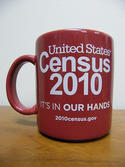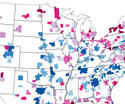When the 2010 Census results were released, a number of big cities had populations that were very off from what would have been expected based on the Census Bureau’s previous annual estimates of the population – sometimes grossly so. Some of these were related to cities that had challenged the estimates and had adjustments made in their favor, such as Cincinnati and St. Louis. Given that the Census Bureau seems to have approved every challenge, bogus challenges were all but encouraged. Still, there were significant variances in cities that didn’t challenge the Census, such as Chicago and Phoenix. read more »
Atlanta
Distortions and Reality about Income Mobility
A ground-breaking study of intergenerational income mobility has the enemies of suburbia falling all over themselves to distort the findings. The study, The Spatial Impacts of Tax Expenditures: Evidence from Spatial Variation Across the U.S. (by economists Raj Chetty and Nathaniel Hendren of Harvard University and Patrick Kline and Emmanuel Saez of the University of California, Berkeley). Chetty, et al. read more »
- Login to post comments
As the North Rests on Its Laurels, the South Is Rising Fast
One hundred and fifty years after twin defeats at Gettysburg and Vicksburg destroyed the South’s quest for independence, the region is again on the rise. People and jobs are flowing there, and Northerners are perplexed by the resurgence of America’s home of the ignorant, the obese, the prejudiced and exploited, the religious and the undereducated. read more »
Density is Not the Issue: The Urban Scaling Research
The "urban scaling" research of Geoffrey West, Luis Bettencourt, Jose Lobo, Deborah Strumsky, Dirk Helbing and Christian Kuhnert on cities has attracted considerable attention (references below). They have provided strong quantitative evidence, based upon voluminous econometric analysis that cities tend to become more efficient as they grow in population. read more »
Housing Affordability Protests Occurring in "Livable" Hong Kong, Not "Sprawling" Atlanta
The Economist has published another in its city rating series, under the headline "The Best city in the World." This one was the result of a contest examining ways to elaborate on its rating system. The winner, Filippo Lovato, added a spatial dimension to the ratings, which included a 5 point rating of "sprawl," a pejorative term for the natural expansion of cities (which in this article means urban areas, areas of continuous urban development). read more »
The Atlanta Transportation Tax: Too Much for Too Little
On July 31, voters in a 10 counties of the 28 county Atlanta metropolitan area will vote on whether to raise the sales tax by one cent for $8 billion in transit and highway projects over 10 years. The measure is highly tilted towards transit spending. Sadly, this would do virtually nothing to reduce Atlanta's traffic or its travel times. read more »
The Shifting Landscape of Diversity in Metro America
Census 2010 gave the detail behind what we’ve known for some time: America is becoming an increasingly diverse place. Not only has the number of minorities simply grown nationally, but the distribution of them among America’s cities has changed. Not all of the growth was evenly spread or did it occur only in traditional ethnic hubs or large, historically diverse cities. read more »
Major Metropolitan Commuting Trends: 2000-2010
As we indicated in the last article, solo automobile commuting reached an all time record in the United States in 2010, increasing by 7.8 million commuters. At the same time, huge losses were sustained by carpooling, while the largest gain was in working at home, which includes telecommuting. Transit and bicycling also added commuters. This continues many of the basic trends toward more personalized employment access that we have seen since 1960. read more »
The Shifting Geography of Black America
Black population changes in various cities have been one of the few pieces of the latest Census to receive significant media coverage. The New York Times, for example, noted that many blacks have returned to the South nationally and particularly from New York City. The overall narrative has been one of a “reverse Great Migration.” But while many northern cities did see anemic growth or even losses in black population, and many southern cities saw their black population surge, the real story actually extends well beyond the notion of a monolithic return to the South. read more »
The Next Boom Towns In The U.S.
What cities are best positioned to grow and prosper in the coming decade?
To determine the next boom towns in the U.S., with the help of Mark Schill at the Praxis Strategy Group, we took the 52 largest metro areas in the country (those with populations exceeding 1 million) and ranked them based on various data indicating past, present and future vitality. read more »





















